|
|
|
Sort Order |
|
|
|
Items / Page
|
|
|
|
|
|
|
| Srl | Item |
| 1 |
ID:
113868


|
|
|
|
|
| Publication |
2012.
|
| Summary/Abstract |
This article explores the socio-economic significance of patronage at the edge of the Indonesian state. It argues that marginal borders and adjacent borderlands where state institutions are often weak, and state power continuously waxes and wanes, encourage the growth of non-state forms of authority based on long-standing patron-client relationships. These complex interdependencies become especially potent because of traditionally rooted patterns of respect, charismatic leadership and a heightened sense of autonomy among borderland populations. The article contends that an examination of these informal arrangements is imperative for understanding the rationale behind border people's often fluid loyalties and illicit cross-border practices, strained relationships with their nation states and divergent views of legality and illegality. The article contributes to recent anthropological studies of borders and believes that these studies could gain important insight by re-examining the concept of patronage as an analytical tool in uncovering circuits of licit and illicit exchange in borderlands.
|
|
|
|
|
|
|
|
|
|
|
|
|
|
|
|
| 2 |
ID:
143309
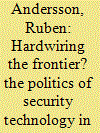

|
|
|
|
|
| Summary/Abstract |
Migration controls at the external EU borders have become a large field of political and financial investment in recent years – indeed, an ‘industry’ of sorts – yet conflicts between states and border agencies still mar attempts at cooperation. This article takes a close look at one way in which officials try to overcome such conflicts: through technology. In West Africa, the secure ‘Seahorse’ network hardwires border cooperation into a satellite system connecting African and European forces. In Spain’s North African enclaves of Ceuta and Melilla, advanced border fencing has joined up actors around a supposedly impenetrable divide. And on the EU level, the ‘European external border surveillance system’, or Eurosur, papers over power struggles between agencies and states through ‘decentralized’ information-sharing – even as the system’s physical features (nodes, coordination centres, interfaces) deepen competition between them. The article shows how such technologies, rather than ‘halting migration’, have above all acted as catalysts for new social relations among disparate sectors, creating areas for collaboration and competition, compliance and conflict. With these dynamics in mind, the conclusion sketches an ‘ecological’ perspective on the materialities of border control – infrastructure, interfaces, vehicles – while calling for more research on their contradictory and often counterproductive consequences.
|
|
|
|
|
|
|
|
|
|
|
|
|
|
|
|
| 3 |
ID:
138857
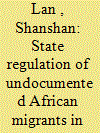

|
|
|
|
|
| Summary/Abstract |
Based on archival and ethnographic research, this paper examines the introduction, nature and implementation of a recent anti-immigrant act in Guangdong province and its implications in the regional, national and international contexts. Chinese state regulation of undocumented African migrants is analyzed with regard to the legal production of African ‘illegality’ in the Guangdong context; the contradictions in the implementation of the Guangdong Act and its unintended consequences; and the discrepancy between anti-African immigrant campaign at the local level and pro-African political ideology at the national and international levels.
|
|
|
|
|
|
|
|
|
|
|
|
|
|
|
|
| 4 |
ID:
171131
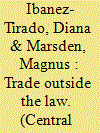

|
|
|
|
|
| Summary/Abstract |
This article analyses the trajectories of two transnational networks present in the Chinese city of Yiwu: Afghan merchants who trade goods in and out Afghanistan, Tajikistan and Pakistan; and Uzbek traders (citizens of either Tajikistan or Uzbekistan) who commercialize their merchandise in and out Tajikistan, Uzbekistan and Russia. Our aim is to capture an ethnographically grounded understanding of informal markets and economies by analysing the notion of trade ‘outside the law’, including the contested yet widely used category of the ‘smuggler’. By paying attention to the fluidity of trading practices ‘outside the law’, we also address the uses and limitations of metaphors widely used in scholarly analysis of informal markets: notably those of ‘lower’ and ‘higher’ forms of globalization, and the transposition of formal-legal and informal-illegal exchanges onto the notions of economic ‘centres’ and ‘peripheries’.
|
|
|
|
|
|
|
|
|
|
|
|
|
|
|
|
| 5 |
ID:
177874
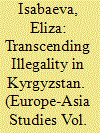

|
|
|
|
|
| Summary/Abstract |
Governments are reluctant to acknowledge illegal settlements. Ak Jar is an illegal settlement on the outskirts of Bishkek. If the settlement were formally legalised, its residents would receive property documents as well as recognition and inclusion. They have thus developed strategies to achieve the legalisation of Ak Jar. Although the settlement is technically illegal, by behaving ‘legally’ (that is, following legal norms and practices), the residents and community leaders generate the appearance and even some of the effects of legality (such as, legitimate power supply, recognition by politicians). This creates a halfway space between ‘legal’ and ‘illegal’ that moves the settlement away from ‘full’ illegality and closer to legalisation.
|
|
|
|
|
|
|
|
|
|
|
|
|
|
|
|
| 6 |
ID:
146136
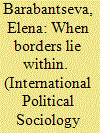

|
|
|
|
|
| Summary/Abstract |
This article examines the changing geopolitical realities which have redefined the nature of sovereign governance on the Sino-Vietnamese border. The binary forms of classification in a rigidly and clearly delimited Sino-Vietnamese borderland replace the ambiguous space of “zomia,” with its fluid and overlapping identifications. This dynamic context sets the conditions for local communities and their long-standing tradition of ethnic marriages straddling the borders of China and its neighboring states. In order to understand how, and why, the status of previously accepted forms of undocumented ethnic marriage has recently changed from “common” (shishi) to “illegal” (feifa) in two ethnic Yao villages, I look at various factors. These include how state discourses on marriage migration in Asia, biopolitical concerns about population security in China, and regional iterations of the global anti-human trafficking campaign, come into play in forceful ways to shape the geopolitical regime of the Sino-Vietnamese borderland and redefine the terms of legitimate practices, thus reconfiguring ethnic marriages as illegal.
|
|
|
|
|
|
|
|
|
|
|
|
|
|
|
|
|
|
|
|
|